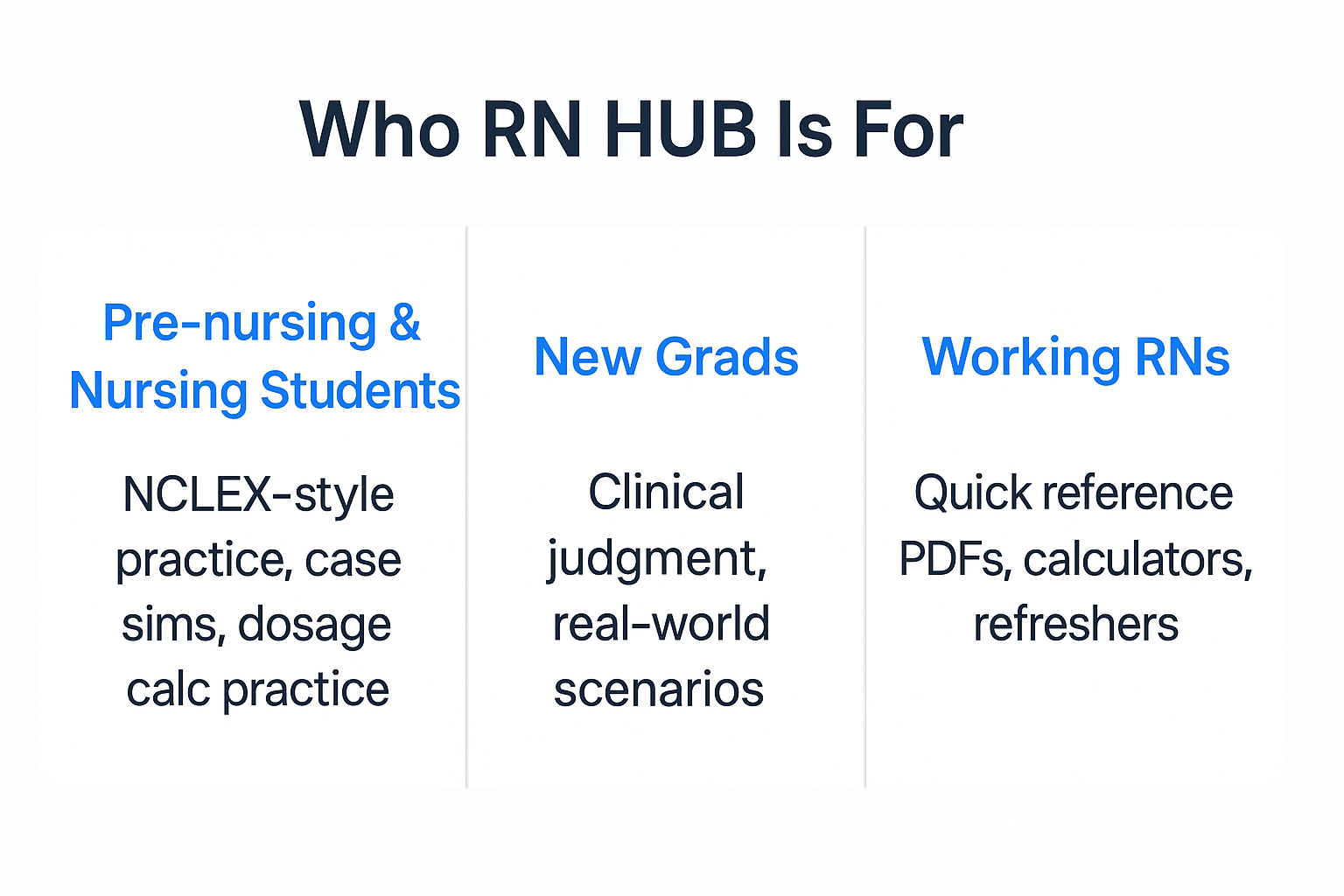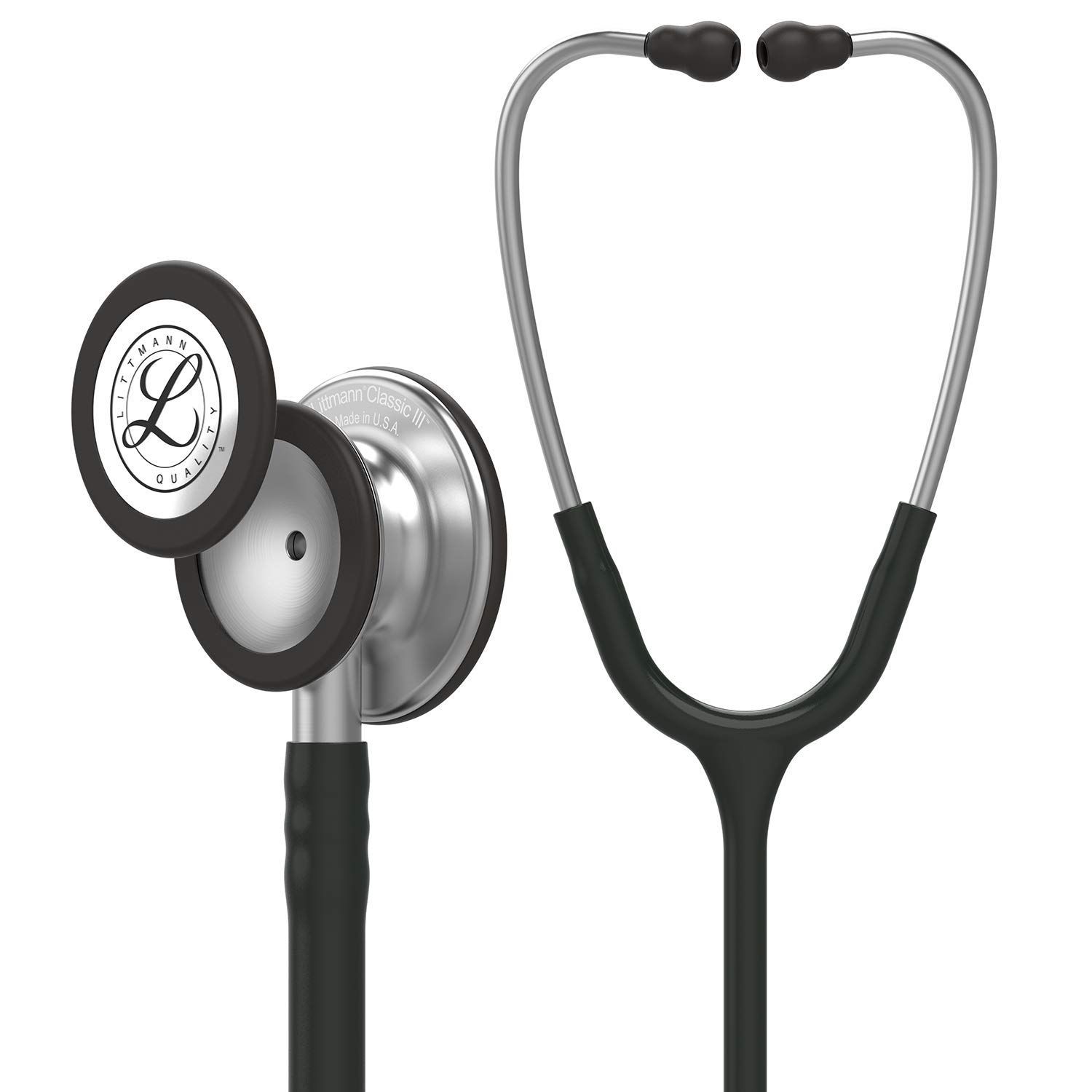Free, High-Quality Tools and Quizzes for Nursing Students and Working RNs.

New and Aspiring Nurses, Start Here!
Embarking on the journey as new nurses is both exhilarating and daunting. The world of healthcare opens up myriad possibilities to aspiring nurses, filled with opportunities to make a difference. But alongside these rewarding moments come challenges that test your skills and resilience daily. As you step into this new, fast-paced and demanding field, thriving requires more than just passion. It demands mastering essential Nursing 101 principles, while embracing continuous learning and development.
To truly excel in nursing, you'll need a toolkit equipped with effective time management strategies, solid patient rapport building techniques, and solutions for overcoming inevitable workplace challenges. Whether it's navigating stress or honing communication skills in healthcare settings, there are proven methods that can ease your transition from novice to confident professional. By leveraging resources such as RN HUB for ongoing support and career success tips, you'll not only survive – you'll thrive in the nursing profession.
As you continue reading, we'll guide you through practical insights and seasoned advice tailored specifically for new nurses like you. Together, we'll explore how to cultivate teamwork in nursing environments and manage stress before it affects your wellbeing. Armed with this knowledge and these resources, you're ready to step into your role with confidence knowing that support is always within reach. Welcome to the journey of a successful nursing career!
Understanding Nursing
Embarking on a career in nursing is like stepping into a vast and vibrant world of healthcare, where foundational knowledge forms the bedrock of professional success. Nursing 101 provides new nurses with the essential principles needed to navigate this demanding environment confidently. It includes mastering core skills such as patient assessment, medication administration, and vital signs monitoring, which are integral to delivering high-quality care. These competencies not only ensure patient safety but also build the confidence you'll need as you transition from novice to seasoned professional.
Mastering these foundational nursing skills is paramount because they serve as the building blocks for addressing more complex clinical scenarios you'll encounter throughout your career. Understanding why certain procedures are performed in specific ways helps prevent errors and enhances patient trust. For example, being adept at interpreting vital signs enables you to recognize early warning signs of medical issues, leading to timely interventions that could potentially save lives. Equally important is developing strong organizational abilities to maintain accurate documentation—an often overlooked yet critical aspect of nursing practice.
To assist in your continuous learning journey, RN HUB offers an array of resources for all nurses looking to solidify their understanding of basic nursing concepts. RN HUB caters to diverse learning preferences and keeps you up-to-date with evidence-based practices. By utilizing these resources regularly, you can cultivate a habit of lifelong learning that aligns with evolving healthcare standards and propels your career forward.
Effective Time Management
Navigating the fast-paced environment of healthcare requires every new nurse to develop robust time management skills. With numerous tasks vying for your attention, from administering medications to documenting patient information accurately, it’s essential to strike a balance that prioritizes both patient safety and personal well-being. One effective strategy is creating a checklist at the start of your shift. This not only organizes tasks but also provides a visual map of what needs immediate attention versus what can be deferred. Remember, flexibility is key; unexpected situations often arise, compelling you to adjust priorities swiftly without compromising care.
Prioritizing tasks involves distinguishing between urgent responsibilities and those that can wait. For instance, attending to a patient's sudden health decline takes precedence over routine paperwork. Utilizing the SBAR (Situation-Background-Assessment-Recommendation) framework could assist in focusing on critical issues efficiently. Scheduling regular breaks is equally significant; fatigue can lead to oversight, which jeopardizes patient safety and your own health. To safeguard against burnout, set realistic objectives for each shift while incorporating brief moments for self-care—even if it’s just a quick breather.
Building Patient Rapport
As a new nurse, building strong rapport with your patients is crucial not only for delivering excellent care but also for ensuring that you create a trusting and compassionate environment. Establishing trust starts with clear communication—listening actively to your patients' needs and concerns while providing explanations and information about their care in simple, understandable terms. This approach helps to demystify medical jargon and empowers patients as active participants in their own healthcare journey. Remember that effective communication isn’t just about speaking; it's also about observing non-verbal cues such as body language and eye contact, which can significantly enhance mutual understanding.
Cultural competence and empathy are vital when cultivating patient rapport. Every patient is unique, bringing with them different backgrounds, beliefs, and cultures that may influence how they view health and wellness. Demonstrating respect for these diverse perspectives encourages patients to feel valued and understood within the healthcare setting. For instance, when dealing with a patient from a background where traditional healing practices are prevalent, acknowledging these beliefs rather than dismissing them outright fosters more open dialogue. Moreover, empathy—expressed through thoughtful interactions—can alleviate anxiety or fear experienced by individuals navigating unfamiliar medical environments.
Real-life scenarios shared by seasoned nurses illustrate the practical application of these principles. One nurse recalls the difference it made when she took an extra moment to sit with an elderly patient who spoke little English. Engaging her family as interpreters allowed the nurse not only to gain insight into the patient's needs but also build confidence among her family members regarding the level of care provided. Another example involves connecting with children by using playful language or games relevant to their age group—helpful tactics that experienced nurses use regularly to comfort young patients during what can be particularly frightening experiences for them in clinical settings. These examples highlight how small efforts toward building rapport can lead to meaningful improvements in patient satisfaction and cooperation while reinforcing your role as a dedicated healthcare professional committed to nurturing positive relationships amidst challenging duties.
Navigating Workplace Challenges
Entering the dynamic world of nursing is both exciting and fraught with challenges that can be daunting for newcomers. New nurses often face a steep learning curve, whether it's adjusting to work shifts, managing high patient loads, or grappling with the emotional weight of patient care. Moreover, understanding hospital policies and navigating interpersonal dynamics within a team require time and experience. It's not uncommon to encounter moments of self-doubt or feel overwhelmed by the fast-paced nature of healthcare environments. However, recognizing these workplace challenges as opportunities for growth is key to thriving in your new role.
One effective way to overcome these challenges is by seeking mentorship from seasoned professionals who possess years of wisdom and practical insights. Experienced nurses can provide invaluable guidance on clinical skills, offer tips for prioritizing tasks efficiently, and share their own experiences about coping with workplace stressors. By building bridges with mentors who have successfully navigated similar hurdles, you forge a support system that boosts confidence and competence in your early career stages. Mentorship also fosters an inclusive environment where knowledge transfer becomes a two-way street: while you gain insights into the nuances of nursing culture, your fresh perspective can invigorate team dynamics.
Communication Skills in Healthcare
Clear communication is the backbone of effective healthcare delivery. For new nurses stepping into bustling clinical settings, mastering communication skills is paramount to ensuring patient safety and achieving favorable outcomes. It's essential for streamlining teamwork and reducing misunderstandings that can lead to costly errors. Whether it's conveying critical lab results during shift change or updating a family about a loved one's progress, clarity in verbal and written exchanges cannot be overemphasized. New nurses need to hone this ability consistently, as it directly impacts both patient care quality and interprofessional relationships.
Active listening stands at the heart of stellar communication skills. As an active listener, you not only hear words but also understand and interpret them within the context of emotions and non-verbal cues. This skill allows new nurses to respond accurately to patients' needs or concerns expressed by team members. Simple strategies include maintaining eye contact, nodding to show understanding, summarizing what you've heard, and asking clarifying questions when necessary. Engaging with empathy builds trust with patients who may feel vulnerable due to their health situations. Additionally, fostering solid connections with colleagues through active listening opens avenues for collaborative problem-solving.
Teamwork in Nursing Environments
Working collaboratively with other healthcare professionals is one of the cornerstones of a successful nursing career. Teamwork not only ensures that nurses can share their workload, reducing stress and potential burnout, but it also fosters a more comprehensive approach to patient care. By pooling knowledge and skills, nursing teams can solve problems more efficiently and devise innovative solutions to the everyday challenges encountered in healthcare settings. For new nurses, integrating into a collaborative team might seem daunting at first; however, engaging with co-workers and understanding each member’s strengths can quickly turn these initial fears into profound synergy.
When nurses work effectively as part of a team, patient outcomes significantly improve. The combination of diverse perspectives allows for thorough assessments and holistic caregiving approaches. Research consistently shows that teams who communicate well and strategically plan their tasks experience fewer medical errors, leading to safer environments for patients. Moreover, participating actively within these groups enhances job satisfaction among nurses by fostering a supportive atmosphere where victories are shared and challenges are tackled collectively. Knowing that everyone is working towards common goals makes daily tasks less taxing and provides emotional support during high-pressure situations.
Stress Management for Nurses
As a new nurse entering the dynamic and demanding healthcare environment, recognizing the signs of burnout and stress is crucial for maintaining both personal well-being and professional effectiveness. Common indicators may include chronic fatigue, irritability, difficulty concentrating, or a decrease in job satisfaction. It's essential to be proactive about identifying these symptoms early on to prevent them from escalating into more significant issues that could impact your health and career. Taking time to reflect on your emotional state after shifts can help you monitor any changes and address stressors promptly.
Incorporating mindfulness practices like meditation into your daily routine can serve as a powerful tool for managing stress. These practices encourage focusing on the present moment and reducing anxiety by promoting relaxation and clarity. Alongside mindfulness, regular physical activity is vital; even brief exercises can elevate mood, improve energy levels, and enhance overall resilience against stress. For instance, setting aside just 10 minutes each day for stretches or engaging in deep-breathing exercises during breaks can significantly alleviate tension.
Thriving in Your Nursing Journey
As you embark on your nursing journey, remember that the keys to thriving lie in continual growth and support. Embrace lifelong learning and tap into professional development opportunities available through RN HUB. These resources offer invaluable insights into effective time management, patient rapport building, and navigating workplace challenges in nursing. Balancing work commitments alongside these educational programs will enhance both your knowledge and confidence without overwhelming your schedule.
Moving forward, apply the practical tips shared throughout this article—from stress management techniques to communication skills in healthcare and teamwork in nursing environments. By actively engaging with these tools, you are setting yourself up for success within the dynamic nursing profession. Empower yourself to overcome challenges by leaning on mentorships and support networks dedicated to ongoing support for nurses. Remember, every step you take towards improvement paves the way for a rewarding career where not only do you flourish, but so do those around you under your compassionate care.
As an Amazon Associate I earn from qualifying purchases to fund this website, to keep it FREE for everyone. All ads take you to Amazon and it doesn't cost you any extra. Thank you for your support!








